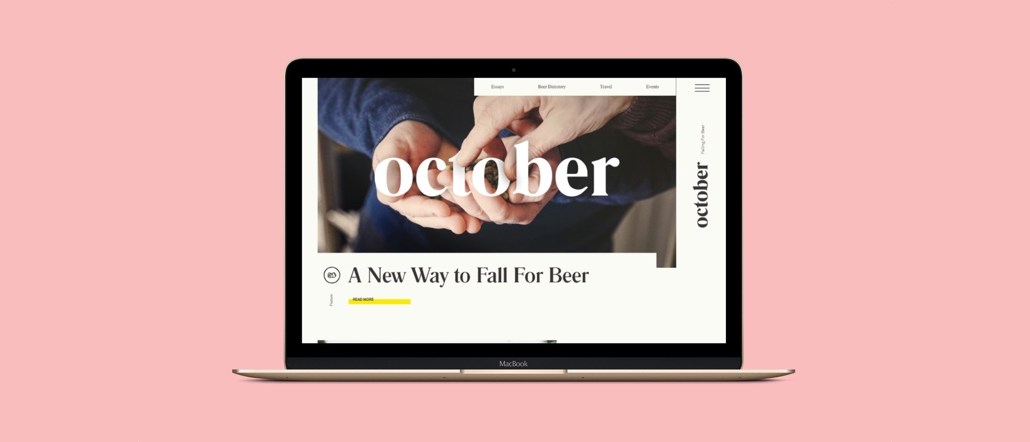Last chance to save on Digiday Publishing Summit passes is February 9
Pitchfork is launching a craft beer site, October, with an advertiser

Pitchfork is going to see if it can do for craft beer what it did for independent music with a site it co-created with beer giant AB-InBev. On Tuesday, the Condé Nast-owned publication’s creative services team launched October, a site with reviews of small-batch suds, essays on topics like beer trading, a directory of beers and, eventually, a regular lineup of events and podcasts.
While Pitchfork has a history of doing sponsored content for brands including Tuborg and Jim Beam, October is the first standalone editorial brand it has created with an advertising partner. The site was originally dreamt up by Mike Raspatello, the global partnerships director at ZX Ventures, a venture capital fund owned by AB-InBev, parent of Budweiser, Corona and other brands. ZX and AB-InBev have a stake in October, though the details of how big that stake is are not public.
The goals for October are similar to the ones that guided Pitchfork, which made its name covering music that was ignored by the mainstream music press. “We’re not trying to be everything to everyone,” said Pitchfork president Chris Kaskie.
October is also similar to other recent launches to come out of publishers’ branded-content divisions, including Supercall, the Diageo-funded site about liquor and cocktails from Thrillist Media Group’s CoLab, and Extra Crispy, the breakfast-focused site from Time Inc.’s The Foundry.
But where Supercall was committed to devote a set percentage of its content to Diageo brands like Tanqueray gin, and Extra Crispy had no sponsors at hand, October will be focused on every kind of beer except the sort produced by its corporate sponsor. There won’t be any AB-InBev branding on the site. October’s mission, like the rest of ZX Ventures’ investments, is to broaden awareness and interest in beer-brewing culture.
While Pitchfork’s creative team will pitch in for the site’s events, design and administrative responsibilities, October also will have full editorial control of its content. Good Beer Hunting founder Michael Kiser will advise on the editorial content, and BeerGraphs founder Eno Sarris will supervise. Both Kiser and Sarris were hired specifically for the launch. October’s independence was hammered home on Thursday, when the site published an op-ed by Kiser entitled “Budweiser is Playing to a Center That Isn’t There Anymore.”
“For this thing to generate value, it cannot be this weird, quasi-marketing machine,” Kiser said.
It will also have to figure out how to fit into, then grow, into a small ecosystem, not unlike the music one that Pitchfork itself entered when the site first launched in the mid-’90s. While craft beer has been on a tear for the past decade or so — it now accounts for more than 20 percent of the $105 billion beer market, according to the Brewers Association — the media attention around it has not kept up.
“We’ve been wondering why no one’s come around to compete with us,” Kiser said, referring to Good Beer Hunting, a separate site about microbrews he’s run for 10 years.
Kaskie said he won’t spend money to grow the site’s audience but will instead focus on word of mouth and collaborate with other Condé Nast brands, including Bon Appétit.
As for advertising, October will rely on programmatic advertising sold directly through Condé Nast’s broader network, but it will look to forge relationships with the 4,500 independent breweries that exist, being careful to do so in ways that keep its credibility intact. That could mean anything from events to brewery-specific activations, Kaskie stressed that advertisers will not be allowed to pay for coverage. “No one will care about the site if we turn into a shill,” Kaskie said.
Having Kiser and Sarris involved from Day One should buy October credibility among craft beer nerds. But building enough with a broader audience that it can put new beers on the map around the world will take time. “I hope that we can earn that kind of authority and trust from our readers over time,” Kiser said.
More in Media

In Graphic Detail: The scale of the challenge facing publishers, politicians eager to damage Google’s adland dominance
Last year was a blowout ad revenue year for Google, despite challenges from several quarters.

Why Walmart is basically a tech company now
The retail giant joined the Nasdaq exchange, also home to technology companies like Amazon, in December.

The Athletic invests in live blogs, video to insulate sports coverage from AI scraping
As the Super Bowl and Winter Olympics collide, The Athletic is leaning into live blogs and video to keeps fans locked in, and AI bots at bay.








